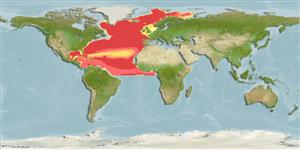Classification / Names
Common names | Synonyms | Catalog of Fishes(genus, species) | ITIS | CoL | WoRMS | Cloffa
Teleostei (teleosts) >
Lophiiformes (Anglerfishes) >
Oneirodidae (Dreamers)
Etymology: Phyllorhinichthys: Greek, 'phyllon' = leaf + Greek, 'rhinos' = nose or snout + Greek, 'ichthys' = fish (in reference to the leaf-like flaps on its snout) (Ref. 86949); balushkini: Named after the Russian ichthyologist Balushkin..
Environment: milieu / climate zone / depth range / distribution range
Ecology
Marine; bathypelagic; depth range 0 - 3200 m (Ref. 53300). Deep-water
Atlantic Ocean: Eastern North Atlantic, off southwest coast of Ireland, Porcupine Abyssal Plain, Western North Atlantic, Bahamas, Eastern North Atlantic, Eastern South Atlantic.
Size / Weight / Age
Maturity: Lm ? range ? - ? cm
Max length : 14.5 cm SL (female)
Short description
Identification keys | Morphology | Morphometrics
Dorsal soft rays (total): 5; Anal soft rays: 5. Diagnosis: Metamorphosed females of this species have longer illicium (16.0-20.8% SL) than P. micractis (11.5-12.6%SL); and further differs in having a single anterior escal appendage (vs. 2), bifurcated only at the distal tip; considerably longer, more slender, distal escal appendage, 36.4-57.6% SL (vs. 6.4-15.8%SL); and, has probably smaller, less-well-developed snout flaps, however, skin of the snout of 3 of the 5 known specimens is torn away that making proper assessment of the character is impossible (Ref. 53300).
Known from five (5) known specimens. A 12.5-cm specimen with about 35-mm long (27%SL) ovaries contains thousands of tiny eggs, each about 0.2-0.3 mm in diameter (Ref. 53300). Minimum depth from Ref. 58018.
Life cycle and mating behavior
Maturities | Reproduction | Spawnings | Egg(s) | Fecundities | Larvae
Pietsch, T.W., 2004. Revision of the deep-sea anglerfish genus Phyllorhinichthys Pietsch (Lophiiformes: Ceratioidei: Oneirodidae), with the description of a new species from the Atlantic ocean. Copeia 2004(4):797-803. (Ref. 53300)
IUCN Red List Status (Ref. 130435)
Threat to humans
Harmless
Human uses
Tools
Special reports
Download XML
Internet sources
Estimates based on models
Preferred temperature (Ref.
123201): 1.7 - 11, mean 5.9 °C (based on 571 cells).
Phylogenetic diversity index (Ref.
82804): PD
50 = 0.7500 [Uniqueness, from 0.5 = low to 2.0 = high].
Bayesian length-weight: a=0.01995 (0.00906 - 0.04395), b=3.01 (2.83 - 3.19), in cm total length, based on all LWR estimates for this body shape (Ref.
93245).
Trophic level (Ref.
69278): 3.9 ±0.5 se; based on size and trophs of closest relatives
Resilience (Ref.
120179): Medium, minimum population doubling time 1.4 - 4.4 years (Preliminary K or Fecundity.).
Fishing Vulnerability (Ref.
59153): Low vulnerability (10 of 100).
